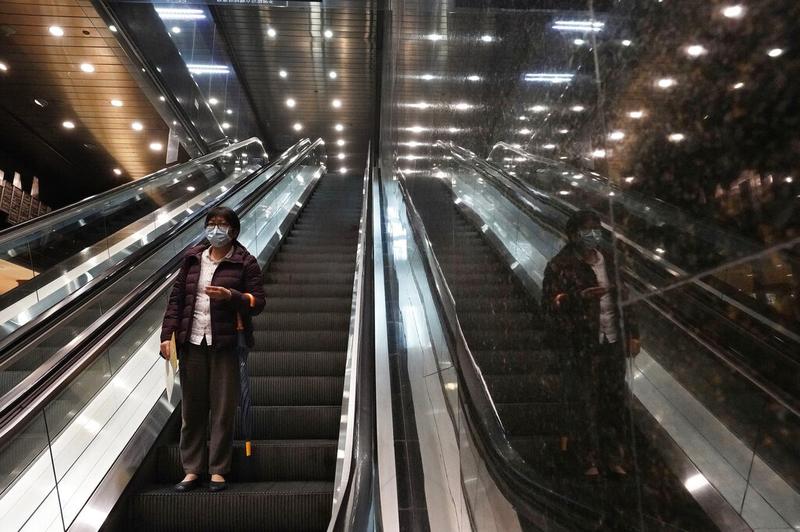 A woman wearing face mask stands on escalator at a near empty shopping mall in Hong Kong April 6, 2020. (PHOTO / AP)
A woman wearing face mask stands on escalator at a near empty shopping mall in Hong Kong April 6, 2020. (PHOTO / AP)
HONG KONG - The COVID-19 pandemic has dealt a blow to the economy, leaving most shops in Hong Kong in peak hours at least half empty, if not deserted. Meanwhile, cloud economy has been flexing its muscles during the period, when social distancing is emphasized.
To further prevent and control the epidemic, the Hong Kong Special Administrative Region (SAR) government has required restaurants to comply with measures such as limiting the number of customers in the restaurant to half of the seats or less, keeping at least 1.5 meters between tables, and limiting each table to four people.
Other companies, small and medium-sized enterprises in particular, also actively sought changes to overcome the challenges by the use of technology and to avoid wage cuts and layoffs
Under the new rules, the demand of online food ordering and delivering surged and some restaurants beefed up their take-out services to keep business afloat.
Hong Kong chain restaurant Tamjai Samgor has shortened the business hours of all their shops across the territory because of the epidemic. One of the shop owners of the restaurant told Xinhua that their dine-in service has been reduced, but fortunately take-out sales went up as some delivery platforms offered discounts.
Other companies, small and medium-sized enterprises in particular, also actively sought changes to overcome the challenges by the use of technology and to avoid wage cuts and layoffs.
READ MORE: Developers bank on online campaigns to lift sales
A business management training company that Hong Kong resident surnamed Chan works for has been unable to carry out face-to-face training amid the COVID-19 outbreak. Therefore, they tried to provide training online and offline in parallel and it turned out to be a sensible decision.
Chan said, although their business was inevitably affected, she and her coworkers were glad that with the help of technology, they were able to adjust their operating approach so that their company could withstand the impact.
Online shopping, which was once outpaced by Hong Kong's rich, convenient and inexpensive physical shopping environment, has also became more popular among Hong Kong people during the outbreak, especially when epidemic prevention materials are in short supply.
Instead of queuing up for hours outside the shops for face masks and hand sanitizers, Hong Kong resident Hugo So bought them through electronic commerce platforms, which he found more cost-effective.
Instead of queuing up for hours outside the shops for face masks and hand sanitizers, Hong Kong resident Hugo So bought them through electronic commerce platforms, which he found more cost-effective
Hong Kong people have become more confident in cloud economy as they are more exposed to it, which laid a market foundation for the growth of this business model. According to the Hong Kong Trade Development Council (HKTDC), online shopping is on the rise in Hong Kong recently, which reflected that Hong Kong enterprises have a chance to win if they could master the skills of online promotion in this difficult time.
ALSO READ: Online sales shine as pent-up demand fueled
A total of 18 large-scale events organized by HKTDC were postponed due to the epidemic, and it launched the Spring Virtual Expo on April 1 to meet the needs of procurement. Deputy Executive Director of HKTDC Benjamin Chau said it is expected that online and offline exhibitions produce synergy and he hoped to see more buyers come to Hong Kong when physical fairs resume.
Both Hong Kong Science Park and Hong Kong Cyberport, the territory's key technology infrastructures, made this year's job fair online, offering about 2,000 positions in total in fintech, biomedical technology, artificial intelligence and robotics, smart living, electronic commerce and other fields related.
Taking place from March 25 to April 21, Science Park's virtual career expo has attracted 40,000 visitors, more than 200,000 views and received 12,000 resumes in the first week.
Albert Wong, CEO of Hong Kong Science and Technology Parks Corporation, said that by leveraging technology, he hoped the expo would provide a new, dynamic talent solution to industries related, breaking free of all the limitations of traditional hiring events.
Cyberport will consider holding physical and virtual job fairs in parallel next year. Eric Chan Sze-yuen, chief public mission officer of Cyberport, said that although the COVID-19 epidemic has impacted many industries, it has also made online activities more active, bringing a large market space for science and innovation industry.
Taking place from March 25 to April 21, Science Park's virtual career expo has attracted 40,000 visitors, more than 200,000 views and received 12,000 resumes in the first week
With the advent of the era of 5G network, Hong Kong will have a stronger foundation for developing business opportunities in the cloud economy. Since April 1, China Mobile Hong Kong Company Limited and other operators have already provided 5G services to the territory.
Li Feng, chairman of China Mobile Hong Kong Company Limited, said that Hong Kong is working hard to combat the epidemic and the company hoped to use science and technology to join hands with the Hong Kong people to face the challenges and inject new strength and possibilities to all walks of life and individuals.


